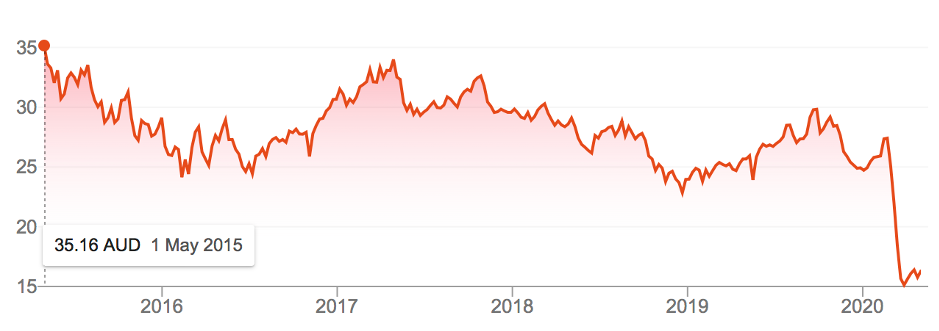

On a week when one of our beloved financial planning clients nicely complained that my daily stories were a little too political and not sufficiently focused on what she was interested in (i.e. NAB cutting her dividend), one of the world’s leading think-tanks has hailed Australia as one of the world champs of beating the coronavirus!
But wait there’s more.
The US-based Brookings Institute put Australia’s national economic stimulus programme on a global pedestal as one of the best! And here’s the irony: this great effort from the Morrison Government supported by the State Premiers and even the Labor Opposition team (who didn’t run interference like typical politicians) has left our economy in a great position to recover quicker than expected.
And if this hope and slightly believable possibility of a much better-than-expected outcome for the Oz economy, business profits, job creation as well as maintenance and future wage rises, all is critical for what my client wants — a higher NAB dividend.
She would also like a higher NAB share price. If these Brookings Institute ratings of both our economic and our virus containment policies are correctly assessed and praised, then my client will get a double pay-off, with the bank’s share price bound to track higher over the next few years.
The NAB story has three drivers. First, the bank hasn’t performed well in recent years. On top of the bagging it copped at the Hayne Royal Commission, along with the exiting of its CEO and Chairman, the share price languished.
Then along came a new CEO in Ross McEwan, who was ex-CBA and headed up RBS for a time but has always wanted to lead an Aussie bank. Kiwis are always aspirational when it comes to kicking butt across the ditch. And all new CEOs like to clear the decks and set themselves up for a great run in charge, so the capital raising and the dividend cut was always a possibility. In later times, Ross could be seen as a successful leader of the bank.
But then along came the Coronavirus and Morrison Government’s recruitment of our big banks to play a big role in the stimulus programmes. It meant that banks deferring loans, cutting interest rates on loans and raising rates on deposits all had to hit the bottom lines of the banks and their share prices had to suffer.
In a sense, the Government not only recruited the banks to help the economy but also the owners of the banks — the shareholders!
So next time you want to give into your excessively leftie bank-hating ways, just remember that strong banks, which don’t always act as nicely as you’d like, can be useful when GFCs and pandemic-economic closures are required!
This chart shows the cost of being a NAB shareholder over the past five years — but look at the pandemic and rescue slug.
NAB over 5 years

So what should I tell my client and others out there who might be worried about their share prices, dividends, jobs, businesses and paying off their house or even being able to buy a home?
First, even the AFR is carrying the story I was set to write this morning. Jacob Greber of the newspaper tells us that Jonathan Rothwell, Gallup's principal economist, and Hannah Van Drie, a programme coordinator at Brookings, recently reported that “Among this group of 20 countries, none have been more successful than Australia and New Zealand at containing the coronavirus.”
And JobKeeper has been praised as a ripper policy idea. “Both Australia and New Zealand created novel business relief programs to retain worker relationships with employers,” the study’s authors wrote. “Early estimates that millions of workers have already benefited.”
That’s great! I’m in high praise for the brains trust that helped our Government get it right on both the health and economic fronts but what’s the pay-off for my client and the rest of us?
Well, provided the “get back to work” policy is done with the same skill and deftness, then the six month hibernation is shortened to say two-three months. This helps the economic rebound, the overall pay going to Aussie households, the resurgence of normal business activities, such as going to a restaurant, the footie and say flying to the Gold Coast or Cairns for a sunny holiday over winter!
If we shorten the economic cost of containment to beat the virus, we grow quicker, bank profits come back faster, share prices rise quicker and the dividend cut in six months or a year’s time becomes a dividend increase.
If the banks are needed less to help the economy because we’re the best in the world at beating the virus and keeping the economy going, then bank profits increase, which feeds the dividends of my client.
And for debt and deficit worriers, the faster we grow the bigger the tax collections and the lower government spending will be. This will help reduce the budget deficit and our overall debt, which is already low on a global comparison basis.
Overnight, the Fed boss Jerome Powell held a new age press conference, where his questioners were zooming in from their home bunkers. He virtually restated the US central bank’s commitment to doing “whatever it takes” to avoid a big economic slump.
Meanwhile, Gilead Sciences’ Remdesvir treatment for the Coronavirus had some new results which were promising. And the S&P 500 stock market index in the States rocketed a big 76 points or 2.66% to 2939. This means the US stock market is only down 13% from its pre-Coronavirus high! You have to hope that this market reaction ends up being based on insightful takes on our economic future.
If the market is right, then economies will rebound in the latter part of 2020 and keep growing into 2021. And my client’s dividends will make a nice comeback as well.
Before I go, here’s a bit of GFC-dividend history, based on the good dividend-payer — the CBA.
In 2008 when the GFC took root and KO’d the stock market, as well as the economy, the annual dividend was $2.66. The next year it was cut to $2.28 and then in 2010 it was $2.82!
It was only one year of a cut dividend. Because we rebounded out of the GFC better than economists expected, the dividend actually was bigger than the 2008 dividend, which had been the biggest on record!
Fears about the future can bring about big dividend cuts but better-than-expected economic rebounds can more than restore those wonderful creations of companies called dividends!